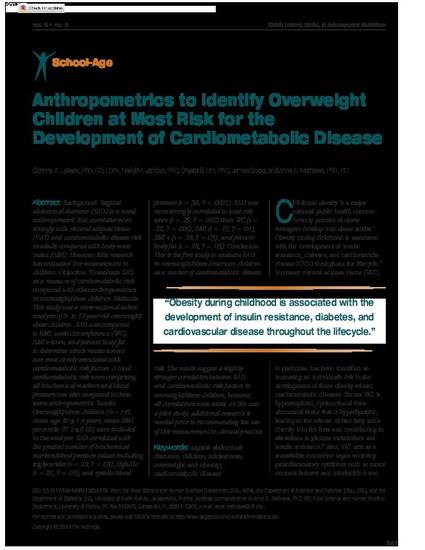
Background. Sagittal abdominal diameter (SAD) is a novel anthropometric that correlates more strongly with visceral adipose tissue (VAT) and cardiometabolic disease risk in adults compared with body mass index (BMI). However, little research has evaluated this measurement in children. Objective. To evaluate SAD as a measure of cardiometabolic risk compared with other anthropometrics in overweight/obese children. Methods. This study was a cross-sectional subset analysis of 8- to 12-year-old overweight/obese children. SAD was compared to BMI, waist circumference (WC), BMI z-score, and percent body fat to determine which measurement was most closely associated with cardiometabolic risk factors. A total cardiometabolic risk score comprising all biochemical markers and blood pressure was also compared to these same anthropometrics. Results. Overweight/obese children (n = 145, mean age 10 ± 1.4 years, mean BMI percentile 97.9 ± 0.02) were included in the analysis. SAD correlated with the greatest number of biochemical markers/blood pressure values including triglycerides (r = .18, P = .03), HgbA1c (r = .21, P = .01), and systolic blood pressure (r = .38, P < .0001). SAD was more strongly correlated to total risk score (r = .25, P = .002) than WC (r = .22, P = .006), BMI (r = .17, P = .04), BMI-z (r = .18, P = .03), and percent body fat (r = .18, P = .03). Conclusion. This is the first study to evaluate SAD in overweight/obese American children as a marker of cardiometabolic disease risk. The results suggest a slightly stronger correlation between SAD and cardiometabolic risk factors in overweight/obese children; however, all correlations were weak. As this was a pilot study, additional research is needed prior to recommending the use of this measurement in clinical practice.
Available at: http://works.bepress.com/corinne-labyak/14/

Published in Infant, Child, & Adolescent Nutrition vol.5 no.6
https://doi.org/10.1177/1941406413501379